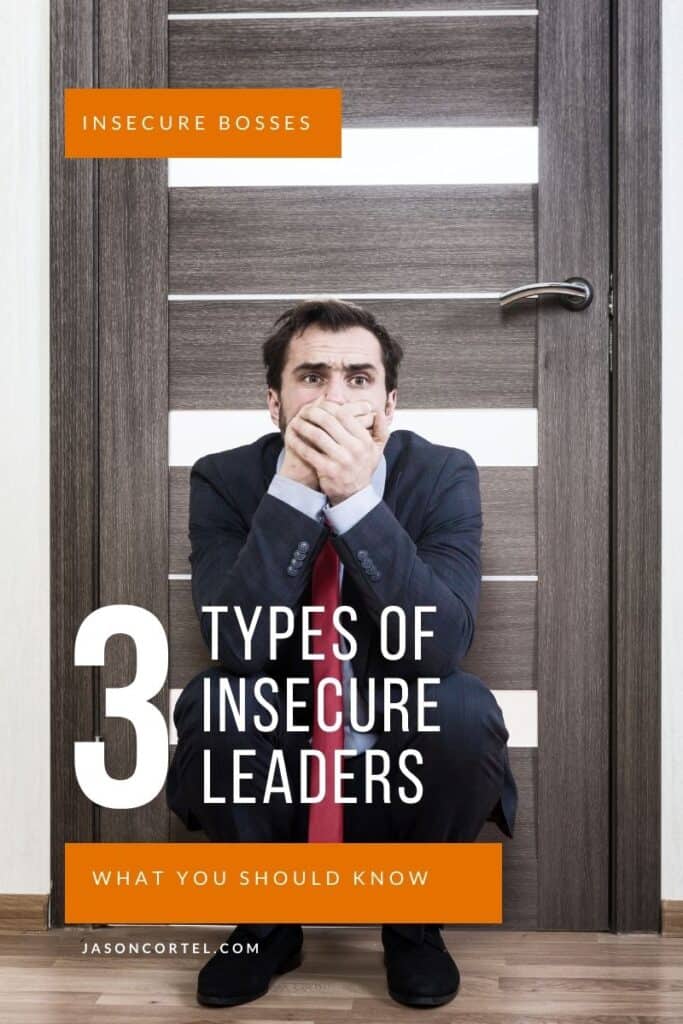How insecure is your boss? It’s no secret that insecure bosses are challenging to work with. Their insecurity causes them to be controlling and vindictive. Your boss’s lack of self-confidence colors everything they do. The way they act is unpredictable – sometimes friendly, capable, and supportive but at other times completely unreasonable. When you catch them in a moment where they’re feeling confident, you forget how insecure your boss is, but then something triggers their insecurity and you get jerked back to reality!
So what can you do if your boss or leader is insecure? This blog post will discuss effective ways for dealing with insecure leaders while improving your work environment, protecting your career, and fostering a productive relationship.
3 Types of Insecure Bosses
- Your boss could be insecure with their career. As a result, they might hold you back out of fear of competition. Or, they might damage your credibility by talking negatively about you.
- They are insecure in their leadership skills. So they don’t hold people accountable, causing you to pick up their slack. Or, they don’t coach and guide you because they don’t believe they have the skills necessary to do so.
- Your boss is insecure about how others perceive them. As a result, they play favorites and blur the line between boss and friend. If you aren’t in the inner circle, your career will stall. If you feel this leader lacks support for you, it is often connected to their friendship with one of your enemies.
What is insecure behavior, and why do insecure bosses behave this way?
We often see a leader who is insecure about their own abilities unable to manage or direct others. They do not know how to be accountable to themselves or others. Your boss is always looking for an easy way out. Additionally, they will do anything to avoid taking responsibility for their mistakes. They will often exhibit the following behaviors:
- Your boss is scared of change and resists it.
- Your boss micromanages and wants to control everything. They are insecure about their own abilities and insecure about your abilities.
- They act overly controlling or abusive, acting like dictators rather than leaders. These insecure bosses will do anything to stay in power, including firing people they don’t think are loyal or obedient enough.
- Your boss holds on to grudges
- Demonstrate passive-aggressive tendencies
- Making excuses
- Your boss evades responsibility
- They make up stories
- Your boss blames others for their own shortcomings and mistakes
- They play the victim card (very common)
- Using favors as leverage
 How to deal with a boss who is insecure about their career
How to deal with a boss who is insecure about their career
Try to understand why your boss isn’t secure in their career. Identifying the cause can help you avoid pushing buttons that will trigger their insecurity. Additionally, knowing the cause will also help you mitigate the effects of their insecurities.
You can use several tactics to deal with a boss who isn’t secure about their career. One option is to get them to talk about their career story. How did they work their way to their current level? What made them pursue this career path? As they explain their story, point out how hard they’ve worked and how long it took them to get there. Finally, link your success to their success. Let’s face it, so much of our career advancement relies on our boss.
Another option would be to praise them on their knowledge and skills. For example, if they delivered an excellent presentation, praise them for how well it went. Your boss might not get praise from their boss, which could cause them to become insecure in their career. Thank them for the knowledge, skills, and coaching they’ve given you, and express appreciation for their mentorship.
How to deal with a leader who is insecure about their leadership skills
When you find yourself working for someone insecure about their leadership skills, coach them up to being a better leader. The process is neither easy nor quick. In addition, it will feel uncomfortable at first, but you need to push through that to improve your relationship with them.
Be forthcoming and transparent so you can begin to develop their trust. For example, let your insecure boss know why you have made certain decisions or taken the approach you took. Bring up issues or conflict in a relaxed and private setting. When sharing your opinion, don’t point your finger at them or make it appear people are gossiping about your boss.
Expose your blindspots and let them know you’ve spent time on self-reflection and soliciting feedback. Next, ask what steps they’ve taken to learn and overcome their blind spots. Finally, approach the conversation asking for help and mentorship.
Ask for guidance or direction, even when you know the answer. Sometimes insecure leaders need permission to offer their input and wisdom. Approaching your insecure boss for advice or recommendations demonstrates your confidence in their leadership skills.
Finally, share books, podcasts, or other development activities you are doing to improve your skills. Lack of knowledge is often the root cause of an insecure boss. Give them ideas on where and how they can gain knowledge to help them become a better leader.
How to deal with an insecure leader who is insecure about how others perceive them
Working for an insecure leader who is insecure about how others perceive them can put you in a no-win situation. Often their insecurities come from comparing themselves to other leaders in the organization. When they start to compare themselves with someone else, discourage them from doing so.
Praise their strengths to calm their insecurities. Everyone brings something to the team and organization. Get your insecure boss to focus on their talents and capabilities while at the same time reminding them it isn’t a popularity contest. Shining a light on your boss’s skills or traits that the team depends on will help them feel less insecure.
Insecure leaders typically aren’t leading. Instead, they breed dysfunction and confusion in the organization. We all suffer from insecurity from time to time. An insecure boss can disguise their insecurity, but it can’t stay hidden for long. For leaders to be effective, they need to recognize and limit their insecurity from affecting their leadership.
These tips should help you coach up when working for an insecure boss. What are some traits you’ve identified in an insecure leader? How have you navigated your career while working for one? Share your story in the comments below.


 How to deal with a boss who is insecure about their career
How to deal with a boss who is insecure about their career